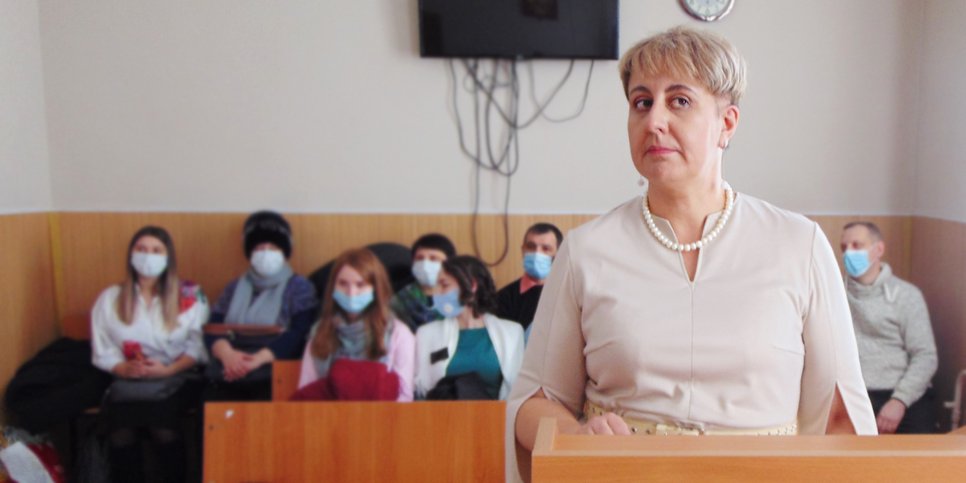Anastasiya Sycheva in the courtroom before the announcement of the verdict. January 2021.
Anastasiya Sycheva in the courtroom before the announcement of the verdict. January 2021.
A Jewish Autonomous Region court sentenced the 43-year-old nurse Anastasiya Sychyeva to two years of suspended sentence for her belief in Jehovah's God
Jewish Autonomous AreaOn January 21, 2021, the judge of the Obluchensky district court of the Jewish Autonomous Region, Olga Afanasyeva, found Anastasiya Sycheva a member of a forbidden organization and sentenced her to 2 years of suspended imprisonment with a 2-year probation period and 6 months of restricted freedom. This punishment was recommended by the state prosecutor.
Anastasiya Sycheva from Obluchye was sentenced only for participation in worship services and communicating with fellow believers. The believer explained to the court that the services teach compassion, mercy, patience, and other Christian qualities, encouragement to avoid violence and immorality. "What kind of extremism are we talking about? I don't understand," she stressed.
After 2017, Anastasiya Sycheva became the 61st Russian citizen found guilty of extremist activity for practicing faith in Jehovah God. The sentence has not entered into legal force. The believer does not admit her guilt and will appeal it. She notes: "...there are no victims in the criminal case. Not a single person was harmed by my actions. After watching the video recordings of the worship services in court, Anastasiya Sycheva explained that during the discussions of the biblical teachings there were not extremist ideas, but appeals to compassion for others, which helps those who lead asocial lives to reform. The prosecutor was never able to answer Anastasia's question about which of these he saw as extremism. On January 15, 2021, Anastasia gave her final word, pointing out to the court that "a minister of God must hate the evil that hurts others. The believer emphasized: "We try just not to hate people, but even to eradicate such thoughts. I cannot be a friend of God by hurting my neighbor. None of the participants of the trial noted that I had a hatred for other people. [...] Jehovah's Witnesses are in no way associated with extremism, on the contrary, they show love for each other and other people."
Almost three years earlier, in May 2018, in the city of Birobidzhan, an FSB special operation with the participation of 150 security officials, code-named "Judgment Day," took place against local Jehovah's Witnesses. As a result, 19 criminal cases were initiated against 22 believers. The case against Sycheva was initiated on September 25, 2019. For more than a year, the believer has been under recognizance not to leave (since October 1, 2019). The case was investigated for 5 months by the Investigation Department of the FSB of Russia for the Jewish Autonomous Region. The case is based on video footage of worship services and recordings of Anastasia's telephone conversations, which, in her opinion, not only lack signs of extremism, but, on the contrary, show respect for the interlocutors.
On 4 March 2020, the case went to court. The hearings lasted more than 10 months. There are at least 26 volumes in the case. A witness for the prosecution, police officer Zvereva, who knew nothing about the events Anastasiya Sycheva was accused of, was questioned in court. Zvereva was involved in the formation of administrative offense cases against the Local Religious Organization and its leaders in 2015-2016, who were found guilty by courts for possession of extremist materials, although they were planted by believers. Also, believers reported to the Investigative Committee of the Russian Federation about the crime committed by law enforcement officers, namely planting prohibited items on them. This report is available in the materials of the criminal case. There was no proper response to this statement from the state.
Anastasia faced many difficulties in her life. Her older sister died of cancer in one year, and later her mother and brother passed away. The believer took care of and raised two nephews, and now cares for her ailing elderly father. Ten years ago Japanese television made a program about the Sychev family. The program was about family values and human relationships. Journalists liked this large, friendly family, and in the summer of 2020, Japanese reporters found Anastasia again. They reported that the program about their family was being re-run. Ironically, in Russia, this well-meaning woman was accused of "participating in extremist activities" (part 2 of Article 282.2 of the Russian Criminal Code).
Russian human rights organizations, as well as the international community, consider the criminal prosecution of Jehovah's Witnesses in Russia unlawful. The Russian government has repeatedly stated that decisions of Russian courts to liquidate and ban Jehovah's Witnesses organizations "do not assess the doctrine of Jehovah's Witnesses, nor do they contain a restriction or ban on the individual practice of the aforementioned doctrine.

